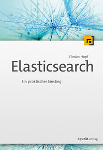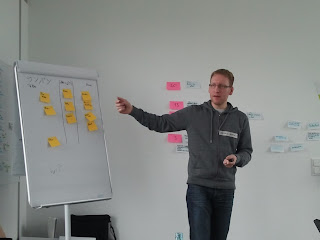Softwerkskammer Rhein-Main Open Space
19 Feb 2013On Saturday I attended an Open Space in Wiesbaden, organized by members of Softwerkskammer Rhein-Main, a very active chapter of the German software craftmanship community. The event took place in the offices of Seibert Media above a shopping mall including a nice view of the city.
The Format
Open Space conferences are special as there is no predefined agenda. All the attendees can bring ideas and propose those in the opening session and choose a time slot and room. Sessions are not necessarily normal presentations but rather discussions so it's even OK to just propose a question that you have or a topic you'd like to learn more about from the attendees. Also, there are some guidelines and rules: sessions don't need to start and end in time, you can always leave a session in case you feel you can't contribute and you shouldn't be disappointed if nobody shows up for your proposed session.
Personal Kanban
Dennis Traub presented a session on Personal Kanban. As I did Kanban style development in one project already I was eager to learn how to apply the principles to personal organization. Basically it all works the same as normal Kanban. Tasks are visualized on a board where a swimlane defines the state of a task with work items flowing from left (todo) to right (done). You can define swimlanes as it fits your habits, e.g. one for todos, one for in progress and one for blocked. The in progress lane needs to have a Work in Progress limit which is the amount of tasks you start and process in parallel. An important aspect is that you don't have to put all your backlog items to the todo lane but you can also keep them in a seperate place. This keeps you from getting overwhelmed when looking at the board.
It sounds like Kanban is a good way for organizing your daily life. For me personally the biggest hindrance is that I am working from my living room and I'd rather not put a Kanban board in my living room. If I'd use a separate office I guess I'd try it immediately.
Open Source
An attendee wanted to know some experiences with Open Source communities. Two full time committers, Ollie for Spring and Marcel for Eclipse, shared some of their experiences. I am still surprised that a lot of Open Source projects have quite some bugs in their trackers that could easily be fixed by newcomers. A lot of people like Open Source software but not that many seem to be interested in contributing to a project continuously. Most of the interaction with users in the issue trackers are one time reports, so the people report one bug and move on. Even for big projects like Spring and Eclipse it's hard to find committers. One way to motivate people is to organize hack days where users learn to work with the sources of the projects but this also needs quite some preparation.
Freelancing
The topic of freelancing was discussed all over the day. Markus Tacker presented his idea of the kybernetic agency, a plan to form a freelance network with people who can work on projects together. We discussed benefits and possible problems, mainly of legal type. A quite inspiring session that also made me think about the difference of freelancing in the Java enterprise world compared to PHP development. Most of the freelancers I know would prefer not to work 5 days a week for one client exclusively but that is often a prerequisite for projects in the enterprise world.
Learning
Learning is a topic that is very important to me so I proposed a session on it. I already switched from 5 to 4 days the last months of my employment at synyx because I felt the need to invest more time in learning which is often not possible when working on client projects. Even now as a freelancer I keep one day for learning only. What works best for me is writing blogposts that contain some sample code. I can build something and when writing the post I make sure that I have a deep understanding of the topic I am writing about. Other people also said that the most important aspect is to have something to work on, reading or watching screencasts alone is no sustainable activity. I also liked the technique of another freelancer: whenever he notices that he could do something different on the current project he stops to track the time for the customer and tries to find ways to improve the project, probably learning a new approach. This is something you are doing implicitly as a freelancer, you often spend some of your spare time thinking about client work but I like this explicit approach.
Summary
All in all this was a really fruitful, but also exhausting, day. Though I chose meta topics exclusively I gained a lot from visiting. Thanks a lot to the organizers (mainly Benjamin), moderators, sponsors and all the attendees that made this event possible. I am looking forward to meeting a lot of the people again at Socrates this year.

